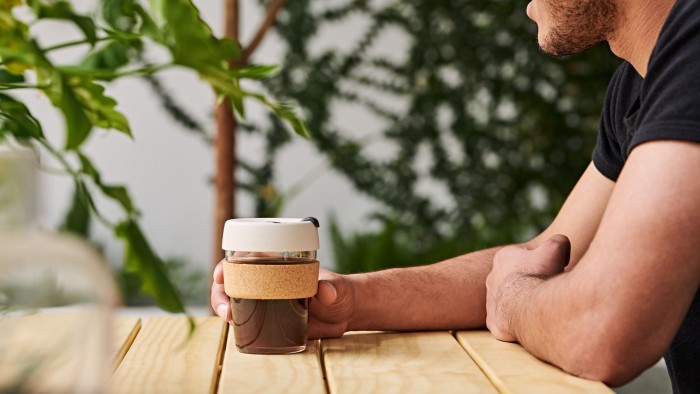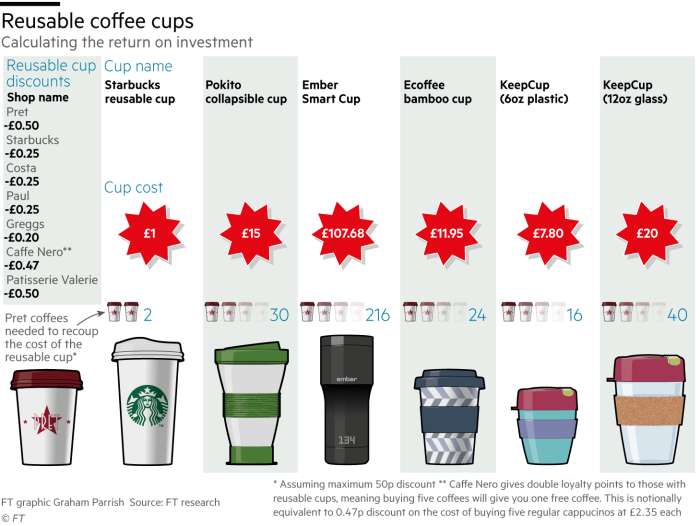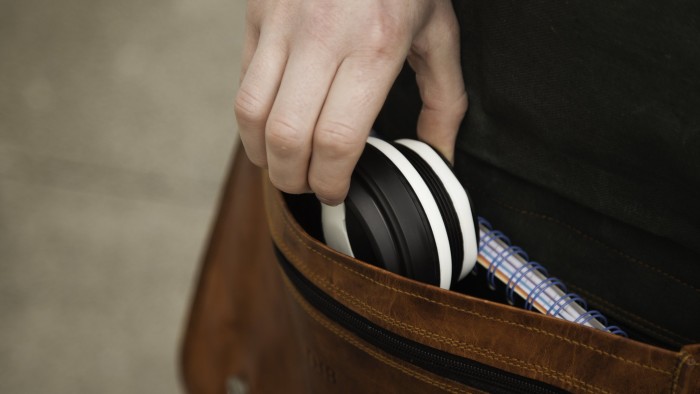What’s the return on investing in a reusable coffee cup?

Simply sign up to the Retail & Consumer industry myFT Digest -- delivered directly to your inbox.

Skinny mocha. Flat white. Cortado. Dirty chai latte. Or an extra-shot grande Americano? Choosing the type of coffee you want is hard enough. Now, the focus has switched to the choice of cup you drink it from.
It is estimated that 2.5bn takeaway coffee cups are thrown away every year in the UK, and they are practically impossible to recycle. Gulp.
More environmentally conscious coffee connoisseurs choose to bring their own reusable cups for baristas to fill — and many chains are encouraging them by offering discounts.
But these discounts vary hugely, and there are as many types of cup as there are types of coffee bean. So which is the best buy and what kind of return on investment could coffee lovers potentially obtain?
The cost of reusable cups ranges from £1 (for a lowly Starbucks reusable beaker) all the way up to $149 (£108) for the Ember Bluetooth-enabled travel cup, which can keep your choice of beverage at a constant temperature for up to two hours. Only available in the US, it is controlled via a smartphone app and can be customised with a 24 carat gold “halo lid” and a recharging coaster.
A solution for a problem that few of us experience, you would have to be seriously wired to think that buying one of these was a good idea. Yet a prolific coffee drinker could break even on their investment if they used it 220 times in Pret A Manger.
How is this possible? Anxious to boost their green credentials, most of the big coffee chains offer discounts of up to 50p per hot drink to encourage consumers to bring their own reusable vessels. Some sell their own too.
So, as well as being better for the planet, using a reusable cup could also be better for your bank account.

The good news is that all the coffee shops I tried were happy to fill any reusable cup I brought along with me. So long as your cup is clean and has a suitable lid, you can use one coffee shop’s branded reusable cup in a rival chain.
However, not all of them offer a discount. There is not a bean to be had from chains including Eat, AMT, Delice de France, Caffè Ritazza, Pumpkin Cafe or Camden Food Co.
However, Pret and Patisserie Valerie offer the most generous discount of 50p per hot drink to those who bring their own cups (Pret will soon start selling its own). This means a cup of Pret filter coffee — which has been faithfully priced at 99p for a decade now — can be yours for just 49p.
Caffè Nero is technically the next best. Its loyalty card (now also available via a contactless tap-and-pay phone app) gives you one point per coffee purchased. For every nine you buy, the tenth coffee is free. But if you take a reusable cup, Nero doubles your points. So if you bought five regular cappuccinos at £2.35, the free drink would effectively save you 47p per coffee, plus you would carry over one loyalty point.
Costa, Starbucks and Paul, the French sandwich chain, all offer a discount of 25p. Paul also has a loyalty card (La Carte Noire) with a free coffee and croissant when you sign up, then your tenth coffee free. Ooh la la! Benugo offers a 10 per cent discount. Even Greggs — which sells surprisingly good coffee for the price — will knock 20p off.
How many coffees it will take to earn back the value of your investment also depends on the type of cup you choose.
The Starbucks basic reusable cup costs £1 — and it looks it. Some of my contacts on social media complained that the cups cracked easily. Better, then, to invest in a cup with a stoppable, leakproof lid that’s robust enough to survive the rigours of commuting and being repeatedly stuffed into a handbag.
Collapsible cups like the Pokito (£15) and the Jerrybox (£10) take up less space in your bag. But heavier, non collapsible cups with intricate locking systems such as the Contigo (between £20 and £30 depending on size and colour) are guaranteed leak-free, and will also keep your coffee warm for hours.

For the hipster in your life, there’s the KeepCup (bright mix and match colours, cork thermal bands and choice of a glass or plastic cup) ranging from £10 to £25.
Cups made from bamboo fibre, such as Ecoffee, are another option at around £12. Patterns include a William Morris range. Who knew that choosing a cup could be so complicated? Yet only 2.5 per cent of Londoners are supping from reusables, according to data from payment platform Yoyo.
The cheapo Starbucks cup will pay for itself after four discounted coffees in the chain, or two in rivals Pret and PatVal. But your future investment returns also depend on its lifespan.
If you sink £10 into a sturdier reusable cup, it will take 20 coffees to pay back (assuming the 50p discount). If you drink five coffees a week — or 260 cups a year — after you’ve paid for the reusable cup, you could save a cool £120.
But you are still spending rather a lot of money on coffee. Based on the full £2.45 price of a Pret regular cappuccino, that’s an outlay of £637 a year (or £507 with the reusable cup and associated discount).
The dedicated coffee enthusiast could substantially boost their investment returns by playing “coffee arbitrage”. The price of an espresso is usually cheaper than a white Americano (in Pret, £1.65 vs £1.99). So buy the espresso in your renewable cup, and get the 50p discount. Then replace the thermal lid, walk back to your work kitchenette, and top up with free boiled water and milk there. You may think this is a lot of effort to go to. Yet I am bringing you this tip because colleagues in the FT office are already doing it.
For the super thrifty, of course, there is the option of bringing in a good old fashioned mug and a cafetière. This is the Money team’s favoured route. I even get 20 per cent off ground coffee in Waitrose (it’s one of the “picks” on my loyalty card) and of course there’s a free in-store coffee too, which I will sip from my reusable cup as the caffeine jitters propel me across the bridge to the FT office.
Claer Barrett is the editor of FT Money; claer.barrett@ft.com; Twitter: @Claerb
Comments